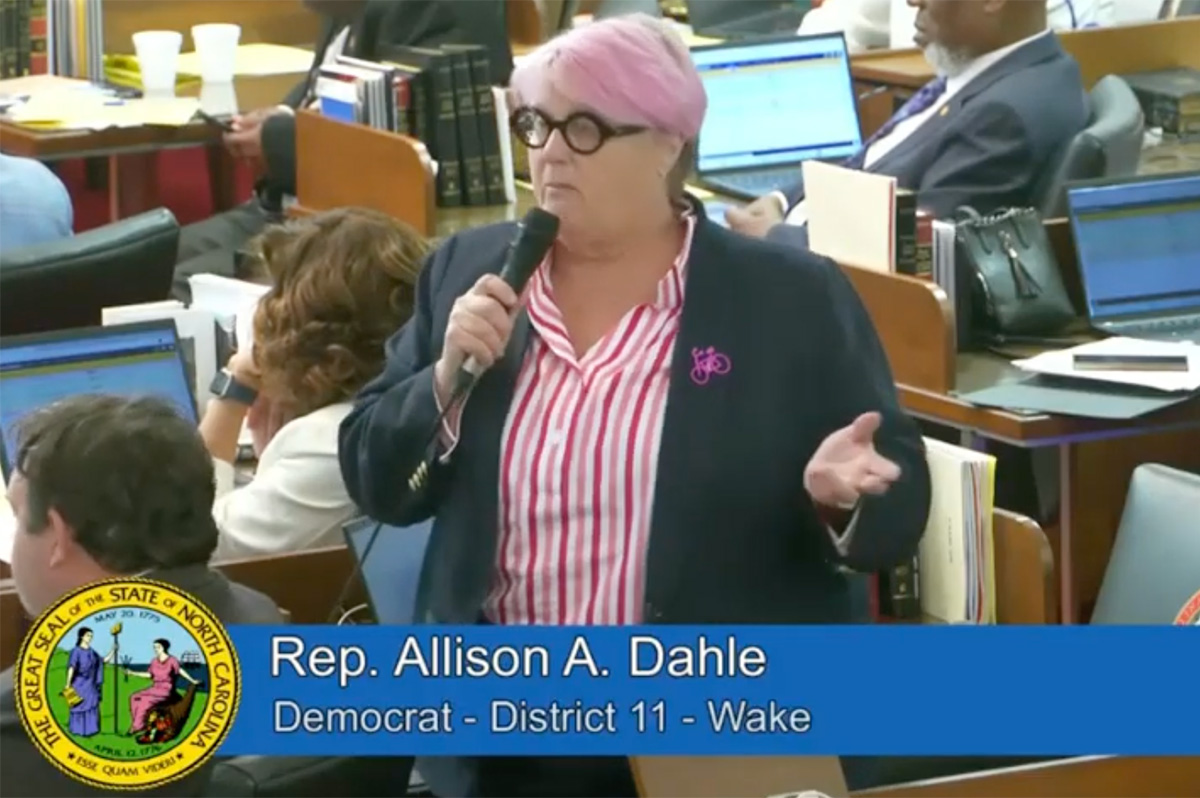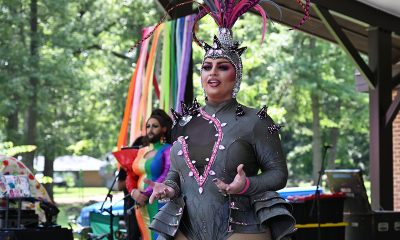News
First female mayor of Bogota marries girlfriend


The first female mayor to be elected in Colombia’s capital city of Bogota has married her female partner just ahead of taking office.
Claudia López, who will be sworn into office in January, announced her wedding to Angélica Lozano on social media, sharing an enthusiastic message and several photographs late on Monday, according to The Guardian.
“On my way to the happiest moment of my life!” the mayor-elect wrote on Twitter.
She thanked her bride for “loving me always” and promised “to honor and love” her the rest of their lives, and posted photographs show the white-clad couple holding a bouquet.
¡Rumbo al momento más feliz de mi vida!
— Claudia López ? (@ClaudiaLopez) December 17, 2019
¡Te amo mi Angelica divina! ¡Gracias por existir y por amarme siempre. Te prometo honrarte y amarte toda la vida!
¡Gracias a la vida por este año maravilloso: me gradué del doctorado, gané la Alcaldía y me casé con el amor de mi vida! pic.twitter.com/Za3njCHUW5
López is also the first openly lesbian mayor of Bogota – or of any capital city in Latin America, where traditional cultural biases, coupled with conservative religious values, often slow the cause of advancing LGBTQ acceptance. In Colombia, same-sex marriage has been legal since 2016.
López has been open about her personal life. She shared a passionate kiss with bride-to-be Lonzano as the pair watched results come in during the October election in which she won her new office.
“Thank you life for this marvelous year!” López posted. “I graduated with my doctorate, won mayoral office and married the love of my life!”
The new bride revealed few details about the ceremony in her post, but said white pant suits worn by the couple were crafted by Colombian designer Ángel Yañez.
India
Indian court rules a transgender woman is a woman
Activists across the country celebrated landmark decision

The Andhra Pradesh High Court on June 16 issued a landmark ruling that says Indian law cannot deny transgender women recognition as women solely because they cannot bear children.
Justice Venkata Jyothirmai Pratapa, who presided over the case, rejected arguments that tie womanhood exclusively to reproductive capacity, declaring such views “legally unsustainable” and contrary to the Indian constitution’s guarantees of dignity, equality, and identity. The decision, rooted in the Supreme Court’s 2014 National Legal Services Authority v. Union of India ruling that recognized individuals as a “third gender” with equal fundamental rights, marks a significant step toward gender justice in India.
“A trans woman, born male and later transitioning to female, is legally entitled to recognition as a woman,” Pratapa declared.
The court emphasized this recognition is enshrined in Articles 14, 15, and 21 of the constitution; which guarantee equality before the law, prohibit discrimination based on sex, and protect the right to life and personal liberty respectively. Pratapa further clarified that trans women are entitled to the same protections as cisgender women under Section 498A of the Indian penal code, which addresses cruelty by a husband or his relatives.
“Denying such protection by questioning their womanhood amounts to discrimination,” said the High Court in its ruling.
The ruling came in response to a petition filed by Viswanathan Krishnamurthy and his parents, who sought to dismiss a dowry harassment case brought by Pokala Sabhana, a trans woman. Shabana alleged that Krishnamurthy and his family subjected her to cruelty and demanded dowry, charges that prompted her to seek protection under Section 498A.
The court’s decision to uphold her legal standing as a woman ensures that trans women can access critical protections against domestic abuse, setting a precedent for future cases.
Section 498A’s applicability to trans women, as the court affirmed, extends critical protections against domestic cruelty to marginalized groups. Trans women can now seek legal recourse under this provision for physical, emotional, or economic abuse, including dowry-related harassment, by their husbands or in-laws. This recognition ensures access to police intervention, potential arrest of perpetrators, and penalties under the Indian penal code, aligning trans women’s marital protections with those afforded to cisgender women. By including trans women under Section 498A, the ruling strengthens their ability to combat domestic violence and assert their rights within familial structures.
Shabana and Krishnamurthy lived together in Ongole, a city in Andhra Pradesh, for a short time before Krishnamurthy relocated to Chennai and ceased communication, according to the court document the Washington Blade obtained.
Shabana filed a complaint at the Ongole Women’s Police Station, alleging her in-laws threatened her life and that Krishnamurthy abused her. Based on her accusations, the police registered a case against Krishnamurthy and his parents under Section 498A.
Krishnamurthy and his parents in 2022 petitioned the Andhra Pradesh High Court to dismiss the case, arguing that Shabana, as a trans woman, could not invoke Section 498A, a provision typically applied to cisgender women.
The petitioners’ counsel argued that trans women, due to their inability to conceive, do not meet the legal definition of a woman and thus cannot invoke Section 498A. They also contended Shabana’s cruelty and dowry harassment allegations were baseless and lacked evidentiary support.
The Andhra Pradesh High Court rejected the petitioners’ arguments, ruling that gender identity does not hinge on the ability to bear children and other biological factors. The court affirmed that trans women, like Shabana, have the right to file complaints under Section 498A and are entitled to all constitutional protections afforded to women under the constitution.
While affirming that trans women are legally recognized as women, the Andhra Pradesh High Court dismissed the case against Krishnamurthy and his family, citing insufficient evidence rather than gender-based arguments.
The court noted Shabana’s claims of dowry demands and cruelty lacked supporting material. It ruled that proceeding with the trial without prima facie evidence would constitute a misuse of the judicial process.
“I am relieved, the delighted and thank the Andhra Pradesh High Court and the judge for upholding our basic human right to be identified as what we want. What better reason could that be for celebrating this Pride Month,” said Kalki Subramaniam, a prominent trans activist and artist. “For transgender community, especially trans women this verdict means a lot.”
Subramaniam told the Blade that the verdict is a momentous achievement. She described it as a significant stride toward justice, dignity, and equality for trans people throughout India.
“By affirming their legal status as women, the court has shattered discriminatory barriers and reinforced the fundamental principle that identity is valid and deserving of full legal protection,” said Subramaniam. “This ruling marks a significant moment of progress, sending a clear message that our legal frameworks are evolving to be more inclusive and reflective of the diverse realities of our society. It is a victory of human rights and a beacon of hope for a more equitable future.”
Meera Parida, a prominent trans activist in Odisha, told the Blade the ruling is a significant triumph.
“Only because a trans woman cannot bear a child, she is not a woman — that’s not good,” she said.
“This is a respectful judgement for all of us,” added Parida. “This is restoring equality and somewhere because of this verdict the stigmatization wall will fall and people will respect us. I respect this verdict.”
“This verdict is very progressive and a crucial step forward to the transgender community and gender equality,” Rani Patel, president and founder of Aarohan, an organization that works to address educational disparities among underprivileged communities and advocates for LGBTQ rights, told the Blade. “People said that we should give them separate toilets and classrooms, but that totally excludes them from the community. Many women also cannot give birth to a child, so that is totally different.”
“If someone is carrying themselves as female, they should be honored with their status,” added Patel. “Since the purpose of the verdict is to recognize trans women as women, they will get all the status and rights as cisgender women in dowry and harassment cases.”
North Carolina
Anti-trans bills in NC may trigger showdown with state’s Democratic governor
State Rep. Allison Dahle spoke out against the effort in an interview with the Blade

Anti-trans legislation passed this week by North Carolina’s Republican-controlled General Assembly will now head to the desk of Democratic Gov. Josh Stein, potentially setting up a showdown with just a few days before the legislature is set to break for the summer recess.
State Rep. Allison Dahle (D-Wake) told the Washington Blade during a phone interview Monday that she was “as confident as I can be” that Stein will reject the bills and also that her Democratic colleagues will line up behind him to block Republicans if they try to override the governor’s veto, which would require support from three-fifths of the House and Senate.
At the same time, there is a good chance one or two members will decide the outcome. Holding 30 of the 50 Senate seats and 71 of the 120 House seats, Republicans can clear the three-fifths threshold so long as there are no defections or abstentions and at least one House Democrat joins with the GOP caucus to override a veto.
Additionally, Dahle stressed that there are no guarantees, particularly as redistricting and shifting demographics can upend expectations for how legislators might ultimately come down on controversial votes. For example, legislation easing gun control restrictions was vetoed last week but remains in limbo because 10 House Republicans did not vote while two joined the unified Democratic caucus in opposing the bill.
With respect to the anti-trans bills passed this week, Dahle said she will “work within every inch, every millimeter of my power” to stop them from becoming law.
First was the Parents Protection Act, which per the Associated Press would “shield parents, guardians and caregivers from being cited for child abuse or neglect because they ‘raise a juvenile consistent with the juvenile’s biological sex,'” and prohibit adoption agencies from denying applicants based on their “unwillingness to allow the child to transition.”
The General Assembly passed the measure Monday with nine House Democrats joining with the GOP caucus. If those margins hold, Republicans would easily have enough support to override a veto.
On Tuesday, the North Carolina Senate passed a bill aimed at strengthening protections against the online sexual exploitation of women and children, legislation that had earned broad bipartisan support before Republican senators led by Buck Newton (Wilson) tacked on a series of anti-trans measures in committee last week, costing four votes from his caucus.
The provisions targeting transgender rights are effectively extensions of culture war legislation that was passed in 2023 during North Carolina’s last legislative session with Republicans overriding a veto from then-Democratic Gov. Roy Cooper.
Specifically, the bill passed on Tuesday would (1) extend the existing ban on most gender-affirming care for minors such that prisoners would not receive state funded gender transition hormones and therapies, (2) require officials who provide new birth certificates with updated gender markers to attach the original document with the individual’s birth sex, and (3) affirm the restrictive definitions for sex and gender that were outlined in President Donald Trump’s Jan. 20 “Defending Women” executive order.
Implications extend well beyond NC
North Carolina’s politics are often eyed as a bellwether or harbinger of trends and developments well beyond its borders because the state’s electorate is closely divided, races are often decided by razor thin margins, and control of the three branches of government is split between the two parties.
One clear take away from the anti-trans bills passed by the General Assembly this week, as noted by the AP, is how closely these efforts align with Trump’s policy agenda in his second term.
Dahle suggested that the culture war bills proposed and supported by her GOP colleagues, including those now awaiting Stein’s signature or veto, reflect the extent to which far-right wing advocacy groups are increasing their influence and exercising their leverage over conservative-led policymaking in the Tar Heel State.
Asked whether she thinks the battle over trans rights legislation in her state will have national implications, Dahle said North Carolina and Texas tend to be where Republicans launch trial balloons to see how far they can push their extreme policy proposals and their efforts to, for instance, undermine elections or redraw district maps to disadvantage Democrats.
She pointed to Allison Riggs, a Democrat who was sworn into the North Carolina Supreme Court on May 13, more than 180 days after she was elected and following a months-long battle in which her Republican opponent and his allies and supporters sought to throw out more than 68,000 votes. Riggs during the ceremony called out “efforts to undermine our rights and our democracy.”
“That was a test case,” Dahle said. “They felt like they had to try.”
With respect to efforts to undermine trans rights through legislation, Dahle said arguments against government involvement in the private lives of its people that might once have appealed to conservatives or libertarians are not picking up traction.
“None of the old school Republicans are left,” she said. Those who have left the General Assembly “know that this is wrong,” while GOP members currently serving either believe these bills serve the best interests of their constituents because “they’ve been fed a line of B.S.” or “they’re just not paying attention and they’re voting with their caucus.”
Dahle continued, “The bills are so extreme. They’re going over anything and everything having to do with transgender people. I mean, anything that has to do with care. I still, for the life of me, don’t know how this has anything to do with family values.”
She added that Republican colleagues promised during debate over a book ban proposal earlier this year that it would be the last culture war bill for a while. “it was pretty much over, or that’s at least what I was told by my colleagues on the other side, and then this one just came out of nowhere.”
District of Columbia
GLAA issues ratings in Ward 8 D.C. Council special election
Declines to rate ousted Council member Trayon White who’s seeking re-election

GLAA D.C., formerly known as the Gay & Lesbian Activists Alliance of Washington, announced on June 22 its ratings for three of the four candidates running in the city’s July 15 Ward 8 D.C. Council special election, saying each of the three have records of support for the LGBTQ community.
The election was called earlier this year when the Ward 8 seat became vacant after the Council voted unanimously to expel Ward 8 Council member Trayon White (D) following his arrest by the FBI on a federal bribery charge in August 2024.
White, who has denied any wrongdoing and was released while awaiting his trial scheduled for January 2026, is one of the four candidates running in the special election to regain his seat on the Council. Under D.C. law, he can legally run for office and serve again on the Council if he wins up until the time he is convicted of the criminal offense he is charged with.
While not mentioning White by name, in a statement accompanying its candidate ratings GLAA said it has a policy of not rating any candidates expelled or who resign from an elected position for ethics violations, including “malfeasance.”
The three candidates it rated – Sheila Bunn, Mike Austin, and Salim Adofo – are longtime Ward 8 community advocates who have been involved in local government affairs for many years and, according to LGBTQ activists who know them, have been supportive of LGBTQ rights. All three are running as Democrats.
White also has a record of supporting LGBTQ issues while serving on the Council since 2017.
GLAA rates candidates on a scale of -10, the lowest possible rating, to +10, its highest rating. Since it began candidate ratings in the 1970s it has based the ratings mostly on LGBTQ-related issues.
But in recent years, it has shifted gears to base the ratings mostly on non-LGBTQ specific issues, saying those issues — such as housing, healthcare, and a call for decriminalizing sex work — impact the LGBTQ community as well as all D.C. residents.
The following are the GLAA D.C. ratings for the three Ward 8 candidates it rated:
Sheila Bunn – 7.5
Mike Austin – 6.5
Salim Adofo – 4.5
Bunn is a former staff member for D.C. Congressional Del. Eleanor Holmes Norton (D-D.C.) and has worked for former D.C. Mayor and later D.C. Council member Vincent Gray (D-Ward 7), a longtime strong supporter of the LGBTQ community.
Austin, an attorney, is a former chair of one of the Ward 8 Advisory Neighborhood Commissions, served as chief of staff in the office of the D.C. Deputy Mayor for Economic Development, and worked on the staff of former Ward 7 Council member LaRuby May (D).
Adofo has served as a Ward 8 Advisory Neighborhood Commissioner since 2018 and chair of his ANC since 2021. His campaign biographical information shows he has been an advocate for affordable housing, improved health care and lower health costs in Ward 8. He is the only one of the Ward 8 special election candidates on the July 15 ballot to express support for LGBTQ rights on his campaign website.
“At the heart of our platform is a steadfast commitment to uplifting LGBTQ+ communities, ensuring that policy is shaped not just for them, but with them,” a statement on his website says.
As of early this week, White did not have a campaign website. He has won re-election for the Ward 8 Council seat in every election since 2017, including the November 2024 election following his August 2024 arrest.
The Capital Stonewall Democrats, D.C.’s largest local LGBTQ political group, which for many years has endorsed candidates running for public office in D.C., decided not to make an endorsement in the Ward 8 special election, according to the group’s president, Howard Garrett.
“We thought that this is best because this is a special election and in these unfamiliar times, we decided not to take a stand,” Garrett told the Washington Blade. But he said his group partnered with the Ward 8 Democrats organization in holding a candidate forum in which the Ward 8 candidates were asked questions “that related to our community.”
Longtime Ward 8 gay Democratic activist Phil Pannell, who is supporting Adofo, said he strongly feels GLAA’s 4.5 rating for Adofo does not reflect Adofo’s strong support for the LGBTQ community.
Fellow Ward 8 gay Democratic activist David Meadows said he is supporting Bunn, who he says also has a strong record of support for the LGBTQ community.
The Blade earlier this week asked each of the four Ward 8 candidates’ campaigns to provide a statement by the candidates explaining their position on LGBTQ issues. As of the end of the business day on June 24, the candidates had not yet responded. The Blade will report on those responses when they are received.
The GLAA ratings and the group’s statement describing the responses to its questionnaire that each of the three candidates it rated submitted can be accessed here:
The websites of the three candidates who have campaign websites, which provide full details of their positions and background, can be accessed here:
Sheila Bunn
Mike Austin
Salim Adofo




















